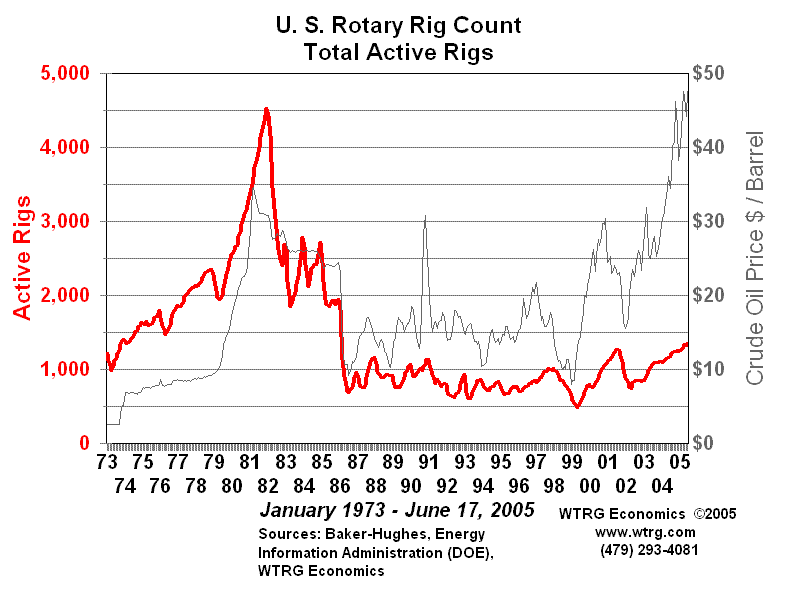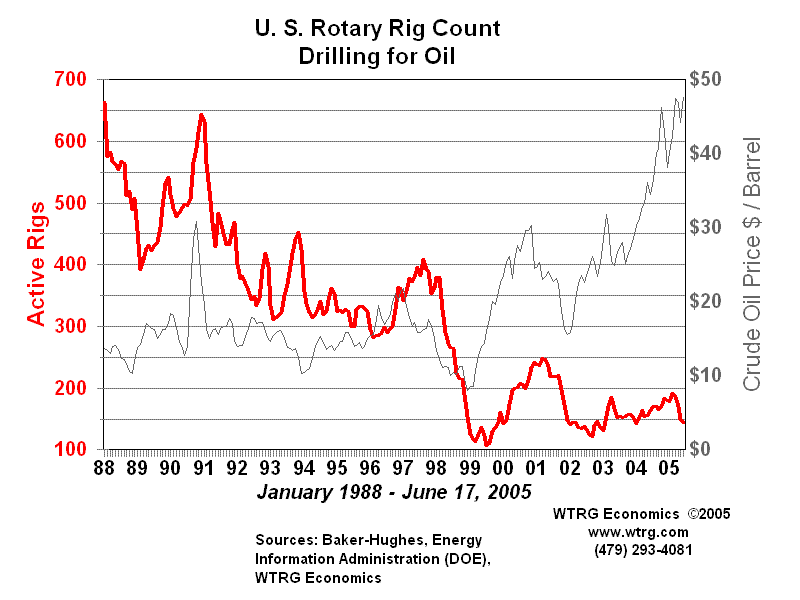The Oil Equation
This statement is on the website of the Democrats in the Senate.The EIA report often cited by Republicans likewise estimates that it will require seven to twelve years from approval before there is any oil production from the ANWR area. (Energy Information Administration, Potential Oil Production from the Coastal Plain of the Arctic National Wildlife Refuge: Updated Assessment, May 2000, SR/O&G/2000-02.) Therefore, production in ANWR will have no impact on current or short-term gasoline and oil supplies and prices.
I note with bemusement that their statements on economic viability are based on a price of $24 per barrel.
They assert that, no matter what we did to increase production at some point in the future, it would have no effect on current oil prices and is therefore not worth doing.
They are horribly wrong. I say "horribly" because of the damage these people are doing to our economy and our prospects for the future right at this moment.
They are wrong philosophically.
They are wrong mathematically.
They are wrong historically.
Let's look at this in some detail.
The Senate Democrats are wrong philosophically.
First of all, look at the dates of these documents in their policy discussion: 1998, 2000, 1996. In other words, if we had acted then, that oil would be in production today and WOULD be having a good effect on oil prices even by their own notions. We ARE in the future they sanguinely asserted wasn't worth providing for. And soon enough, actions will take now would benefit our own future, just as the failure to take those actions harms us.
Run through the same scenario, but substitute "savings" for drilling. By that logic, it makes no sense to save money, since it is only useful for the future.
Since the drilling plan would cause 99%+ of Alaska's giant ANWR park to remain as it is, there's not much on the other side of their balance sheet.
The Senate Democrats are wrong mathematically.
Here's a paper (PDF file) asserting, mathematically, that future oil production has an effect on current prices. The approach is formulaic in the other sense of the word; here's an excerpt:

While they are correct, I don't think that this approach makes the point very well to the US public. It's intended for those with economics training. ];-)
The abstract is more readable; here's part of it:In this paper, we use simple two-period models to show that if an amount of newly discovered oil is significant enough to reduce prices in the future, any drop in future prices reduces the future profitability of oil, reducing the marginal user costs of oil now.
That reduction in the marginal user costs reduces the current price of oil just as if there were a reduction in the marginal costs of extracting oil now. We explore the effects of the reduction in marginal user costs in the competitive or price-taker case as well as the price-searcher case, where a monopolist or dominant supplier responds to a substantial discovery by another seller, but where the discovery will not contribute to production for some years to come.
In both cases, we find that oil that is expected to reach the market at some time in the future has an immediate impact on oil prices.
The Senate Democrats are wrong historically.
Take a look at this chart from this history and analysis site. Note that, as prices shot up in the 1970s, we launched a massive campaign to look for new oil. In less than a decade, we went from 1,000 drilling rigs to 4,500 -- and even though we didn't actually have much new oil flowing the price fell dramatically because we were serious about it. It fell 10% within a year, and by six years had fallen by more than 75%. (Inflation effects make this even more dramatic.)

But the idea that OPEC and company had, to stop our drilling (and thus our potential competition), worked -- and by not long after the 1986 price drop we had fewer rotary rigs going than when we started.
And look what has happened in recent times:

The number of active rigs drilling for oil dropped to about 100 -- giving our overseas suppliers the go-ahead to crank up the price, as we've rendered ourselves (by legislation) economically defenseless.
Perversely, it is merely the threat of drilling for oil that would affect the price -- and the lead times would be shorter yet, if we looked serious about it.
But we should NOT quit this time when the prices drop! And nuclear and space solar power and other sources need serious attention as well. Unlike the Senate folks above, I believe that we have a future, and that it's worth doing something about.
===|==============/ Level Head
I note with bemusement that their statements on economic viability are based on a price of $24 per barrel.
They assert that, no matter what we did to increase production at some point in the future, it would have no effect on current oil prices and is therefore not worth doing.
They are horribly wrong. I say "horribly" because of the damage these people are doing to our economy and our prospects for the future right at this moment.
They are wrong philosophically.
They are wrong mathematically.
They are wrong historically.
Let's look at this in some detail.
The Senate Democrats are wrong philosophically.
First of all, look at the dates of these documents in their policy discussion: 1998, 2000, 1996. In other words, if we had acted then, that oil would be in production today and WOULD be having a good effect on oil prices even by their own notions. We ARE in the future they sanguinely asserted wasn't worth providing for. And soon enough, actions will take now would benefit our own future, just as the failure to take those actions harms us.
Run through the same scenario, but substitute "savings" for drilling. By that logic, it makes no sense to save money, since it is only useful for the future.
Since the drilling plan would cause 99%+ of Alaska's giant ANWR park to remain as it is, there's not much on the other side of their balance sheet.
The Senate Democrats are wrong mathematically.
Here's a paper (PDF file) asserting, mathematically, that future oil production has an effect on current prices. The approach is formulaic in the other sense of the word; here's an excerpt:

While they are correct, I don't think that this approach makes the point very well to the US public. It's intended for those with economics training. ];-)
The abstract is more readable; here's part of it:In this paper, we use simple two-period models to show that if an amount of newly discovered oil is significant enough to reduce prices in the future, any drop in future prices reduces the future profitability of oil, reducing the marginal user costs of oil now.
That reduction in the marginal user costs reduces the current price of oil just as if there were a reduction in the marginal costs of extracting oil now. We explore the effects of the reduction in marginal user costs in the competitive or price-taker case as well as the price-searcher case, where a monopolist or dominant supplier responds to a substantial discovery by another seller, but where the discovery will not contribute to production for some years to come.
In both cases, we find that oil that is expected to reach the market at some time in the future has an immediate impact on oil prices.
The Senate Democrats are wrong historically.
Take a look at this chart from this history and analysis site. Note that, as prices shot up in the 1970s, we launched a massive campaign to look for new oil. In less than a decade, we went from 1,000 drilling rigs to 4,500 -- and even though we didn't actually have much new oil flowing the price fell dramatically because we were serious about it. It fell 10% within a year, and by six years had fallen by more than 75%. (Inflation effects make this even more dramatic.)

But the idea that OPEC and company had, to stop our drilling (and thus our potential competition), worked -- and by not long after the 1986 price drop we had fewer rotary rigs going than when we started.
And look what has happened in recent times:

The number of active rigs drilling for oil dropped to about 100 -- giving our overseas suppliers the go-ahead to crank up the price, as we've rendered ourselves (by legislation) economically defenseless.
Perversely, it is merely the threat of drilling for oil that would affect the price -- and the lead times would be shorter yet, if we looked serious about it.
But we should NOT quit this time when the prices drop! And nuclear and space solar power and other sources need serious attention as well. Unlike the Senate folks above, I believe that we have a future, and that it's worth doing something about.
===|==============/ Level Head